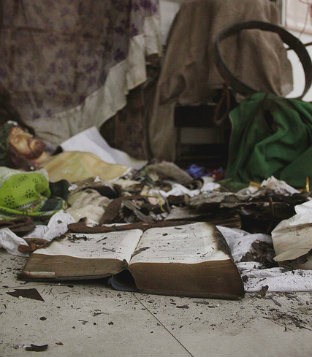Persecuted

In Eritrea, one of the earliest Christian countries in the world, a military compound has been turned into a prison complex housing 2,000 to 3,000 Christians. They are imprisoned because they are part of a small independent Protestant community that is not approved by the government.
Eritrea is far from the only place where Christians are suffering for their faith. According to the International Society for Human Rights, 80 percent of all acts of religious discrimination in the world are directed toward Christians. John L. Allen Jr., author of The Global War on Christians: Dispatches from the Front Lines of Anti-Christian Persecution, says that the global war on Christians is the greatest story not being told in the 21st century. By one estimate, as many as 11 Christians are killed each hour somewhere in the world. The Pew Forum reported that, between 2006 and 2010, Christians faced some form of discrimination in 139 countries—close to three-fourths of all the nations of the world.
Read our latest issue or browse back issues.
Of the 65 churches in Baghdad, 40 have been bombed since the United States’ invasion of Iraq in 2003. Iraq had a flourishing Christian community of about 1.5 million at the start of the war; now it is a third that size. In Egypt, 40 Coptic churches were burned and looted in August in a wave of attacks blamed on radical Islamists. In September a suicide bomber attacked a church in northwestern Pakistan, killing 85 people. Living under strict antiblasphemy laws, Christians throughout the country are being accused of blasphemy because of their Christian convictions. In Syria, Christians are caught in the cross fire of a civil war and are targeted by radicals on both sides.
Persecution is occurring not only in the Middle East but in Nigeria, Kenya, Burma, India and North Korea. North Korea may be the worst place in the world to be a Christian; it’s believed that a quarter of the country’s Christians live in forced-labor camps.
Allen says that one reason the story isn’t being told is that many people in the West, having learned about the history of Christian imperialism, have trouble believing that Christians are among the oppressed, not the oppressors. Others are wary of the anti-Muslim fervor that fuels some people’s focus on Christian persecution.
Christians are concerned wherever and whenever people are denied religious freedom, but we have a special bond with other Christians. In solidarity, we can educate ourselves about their plight. We can hear their stories and listen to their perspective on the world—which may not match the perspective of American Christians. We can petition our government to keep the plight of Christians in view. And we can pray. A good day to do that is on the International Day of Prayer for Persecuted Christians (sponsored by the Religious Liberty Commission of the World Evangelical Alliance), which this year is November 10.





